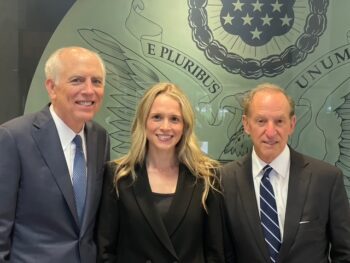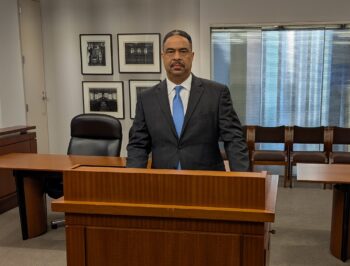Stephanie Hockridge and her husband, Nathan Reis, were indicted on federal fraud charges in connection with their efforts to help small businesses obtain forgivable loans under the Paycheck Protection Program. Tried before U.S. District Judge Reed O’Connor in Fort Worth, Hockridge was convicted of conspiracy Friday. Reis is scheduled for trial in August.

Anatomy of an Acquittal — Delayed Vindication
At the very end of the series Mad Men, the yoga instructor encourages his class, which includes the show’s protagonist, Don Draper, with the following words: “A new day. New ideas. A new you.” From the perspective of the defense team at least, that’s a fitting introduction to the retrial of United States v. Hamilton, which resulted last week in an acquittal on all charges of conspiracy to commit bribery and two substantive counts of bribery. In the retrial, the government tried precisely the same case it tried four years ago. And why not? That case resulted in a conviction on three of four charges, which led to an eight-year prison sentence imposed by the district court.

Thousands of Texas Hemp Jobs at Risk as State Legislature Passes THC Ban
Thousands of Texas hemp retailers and their employees face looming legal and financial uncertainty after lawmakers approved a sweeping ban on psychoactive THC products, including popular delta-8 and delta-9 edibles, vapes and beverages. Gov. Greg Abbott has stayed neutral on the issue, declining to say whether he plans to use his veto pen or let the bill become law by the June 22 deadline. (Photo by Jim Vertuno/The Associated Press)
Trial Commences in Alleged $300M Wire Fraud Scheme
Opening statements began in the trial against one fintech founder Thursday morning. Stephanie Hockridge was federally indicted in 2024 for allegedly committing wire fraud through a Paycheck Protection Program fraud scheme.

Legislation Aims to Boost Texas as a Friendly Place to Incorporate and Settle Disputes
A new law makes it more difficult for shareholders to challenge corporate decisions through litigation. A second bill headed to the governor’s desk would enhance the fledgling Texas Business Court’s authority, although lawmakers decided for now against expanding the system to rural Texas. (Photo by Ricardo Garza)
President Names Career Prosecutor as NDTX U.S. Attorney
President Donald Trump has named Nancy E. Larson, a career federal prosecutor, as the Acting United States Attorney for the Northern District of Texas.
Inside a Whistleblower’s Ordeal: Tyler Shultz Details the Battle to Expose Theranos
Tyler Shultz still remembers the exact moment he realized that Theranos, a Silicon Valley health technology startup claiming to have revolutionized blood testing, was a fraud. Shultz shared his story of blowing the whistle on Theranos during a panel discussion hosted by The Texas Lawbook, SMU Dedman School of Law and the SMU Rowling Center for Business Law & Leadership. And he has a powerful call to action for lawyers.

Bracewell’s Jeff Vaden Weighs in on White-Collar Trends and their Texas Impact
Texas remains a focal point for white-collar litigation amid shifting priorities and an ever-changing enforcement landscape. The Texas Lawbook caught up with white-collar expert Jeff Vaden, a partner in Bracewell’s Houston office, about trends, the Trump Administration’s priorities, what they could mean for Texas and more.
Trump’s First 100 Days Marked by Record Number of Executive Orders
In his second term, President Donald Trump has issued more executive orders in the first 100 days — 35 of them focusing on energy, environmental and infrastructure efforts and law firms — than any other president in history, creating a flurry of governmental actions, broad economic implications and legal challenges, according to a panel of legal experts hosted by The Texas Lawbook.
SEC Says 3 DFW Residents Ran $91M Ponzi Scheme
Kenneth W. Alexander II, Robert D. Welsh and Caedrynn E. Conner are accused of defrauding more than 200 investors out of millions via a trust Alexander controlled called Vanguard Holdings Group Irrevocable Trust. The SEC filed the 37-page lawsuit against the trio in the Eastern District of Texas, Sherman Division, on Tuesday.
- Go to page 1
- Go to page 2
- Go to page 3
- Interim pages omitted …
- Go to page 28
- Go to Next Page »